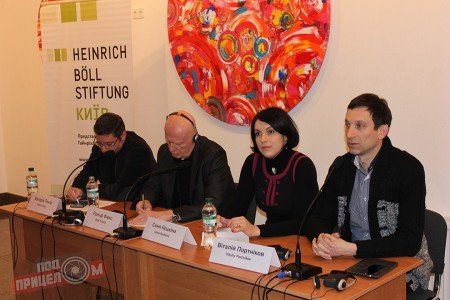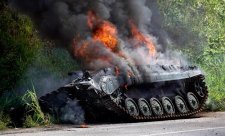 Ukraine is caught in a very complicated geopolitical, economic, humanitarian situation now. How is it possible to get out this crisis? How is it possible to build a new state under conditions of the war? How is it possible to survive at all? These questions became crucial during the public discussion “In what way can Ukraine win the war? Geopolitical and humanitarian dimensions”, participates of which talked a lot about the war and peace, destinies of Ukraine and Russia, assistance of the West, future of occupied Crimea and Donbass and also about Maydan that became a departing point for the Ukrainian society.
Ukraine is caught in a very complicated geopolitical, economic, humanitarian situation now. How is it possible to get out this crisis? How is it possible to build a new state under conditions of the war? How is it possible to survive at all? These questions became crucial during the public discussion “In what way can Ukraine win the war? Geopolitical and humanitarian dimensions”, participates of which talked a lot about the war and peace, destinies of Ukraine and Russia, assistance of the West, future of occupied Crimea and Donbass and also about Maydan that became a departing point for the Ukrainian society.
War and Peace
Talking about the Ukrainian-Russian confrontation, Sonya Koshkina, who is the head editor of the web-site “Liviy bereh”, noted that in reality there is the war between Putin and the West and “Ukraine is merely a battle ground”. How far the aggressor is going to get depends not that much on Ukraine, as on “tactics of the West, its symmetric or asymmetric actions”, the Ukrainian journalist believes.
Continuing this thought, Valeriy Pekar, who is the businessman, co-founder of the civic platform “New state”, identifies two dimensions of the Ukrainian conflict: the outer one and the inner one. On the outer dimension there is the war going on between Ukraine and Russia, the strategic objective of which “is destruction of the Ukrainian project” by means of inflaming a civil war following the Syrian scenario: “when people already fight not for something but because a friend has been killed”. In this meaning, it is war for survival. However, in the expert’s opinion, another dimension of the confrontation is equally important – the war between the old and the new, between “Ukraine and the Ukrainian Soviet Socialist Republic, between two state systems, which live in one time and on the same territory,” but in different dimensions. In order to win in the war of the first dimension, it is necessary also to defeat the “hydra” from the past.
Russia and Ukraine
All the participants spoke about the fact that Russia in the form it exists today is doomed for decay or even death. However, what will it mean for Ukraine?
Vitaliy Portnikov, who is the prominent Ukrainian journalist and publicist, believes that Russia is going to fall no matter whether it is the thing that the Americans or the Europeans want or don’t want, whether they weaken sanctions or not”, because “the authorities of kleptomaniacs will do it instead of them.” This is why, in expert’s opinion, we are going to witness the “second collapse of the USSR and the third collapse of the Russian Empire”. It is important for the Ukrainians not to board the sinking ship. “We should be onboard of the ship for the ones, who watch the wreckage, not onboard of the drowning ship, because if it pulls us to the bottom, we won’t be able to emerge”.
Valeriy Pekar supports this thesis because, in his opinion, “strong, aggressive Russia is a threat for Ukraine, weak and ruined Russia is also a threat,” but we were destined to live at times of “collapse of the neighboring empire”. This is why, the only way out for our country “is to be very strong politically and economically” and not to rely a lot on support of the West, which we have to protect again as it was several centuries ago “from that chaos that comes from the East”.
Diplomacy and part of the West in negotiation of the Ukrainian crisis
All the experts agree with the thought that Minsk, even in case that the agreement is going to be signed, can be considered only as a cessation of hostilities on a certain level. As Sonya Koshkina says, “Minsk is a chance to regroup forces, gain some time and use it right”. Valeriy Pekar thinks that nothing depends on Minsk, because destiny of Ukraine is decided on two fronts: “the first frontline is Donbass and the second one spreads through the government offices.”
The representative of the European professional opinion Ralf Fücks, who is the Chairman of the Heinrich-Böll-Foundation, estimates the policy of Europe on the current stage as a constant hesitation between support of Ukraine and deterioration of relations with Russia. “Europe still hesitates,” Fücks says, “although the understanding that actions of Russia has destroyed the postwar security system in Europe grows.” However, thereby there are two important factors, which hinder the Europeans to form a common position regarding the Ukrainian crisis. “These are the economic interests, because there are very powerful economic connections between Germany and Russia and the fear of war against the nuclear state. Europe does not want to be involved into a military conflict with Russia at all,” the German expert believes. This is why, no matter how cynical it may sound, Europe stands in front of a very important choice “between solidarity and attempts to solve the conflict at all cost, even at the expense of Ukraine, its territory and European ambitions.”
Donbass and Crimea
Valeriy Pekar compared the Russian Crimea with another subject of the Federation, with Chechnya. Today Crimea is factually like Chechnya, the territory that always demands money from the Federal government. The government gives them the money but in reality, they are bandits. If Chechnya is a big bandit, that’s why it is paid big money, then Crimea is a small bandit and it is paid small money,” he emphasizes. But he thinks that even reformed and blooming Ukraine isn’t a reason for the occupied territories to return to it. However, even without Crimea and Donbass Ukraine has already taken a leap into the future: “According to the information of psychologists, Ukraine should have become a European state by 2030. Because of loss of Crimea and Donbass, we got to in 2035”, Pekar summarized.
Maydan
However, the most important thesis that united all the interlocutors, obviously, was Maydan, which, in opinion of Valeriy Pekar, is a triple revolution: the economic one (fight of the middle class against the neo-feudalism), the anticolonial one (the end of the national liberation fight of the Ukrainian people), and the mental one (the very “revolution of dignity”). This is why Maydan and the war are indissolubly tied: “There is no line between Maydan and the war. It is one process, because a national liberation revolution never ended in a peaceful way in history.”
Vitaliy Portnikov suggests to consider Maydan as a start, “the first historical chance for the Ukrainian people as a political nation to build a European civilized democratic country.” We have to use this chance, win the war on the outer and inner battle fields, defeat that “hydra”, conduct reforms and build a new country. Maybe already not for ourselves, Sonya Koshkina says, but for children and grandchildren.












